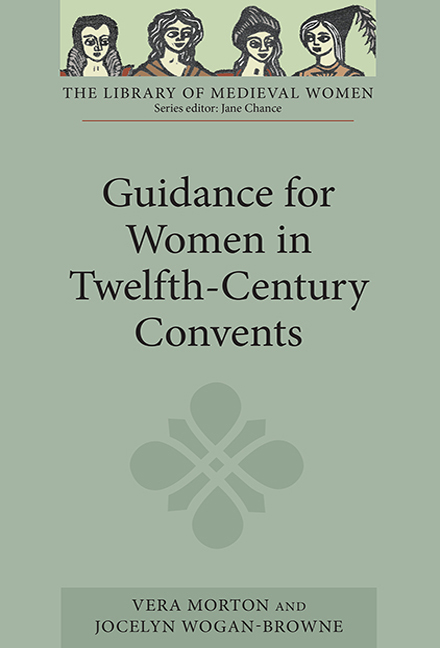Book contents
- Frontmatter
- Contents
- Preface
- Acknowledgements
- Abbreviations
- Introduction
- Note on Texts and Translations
- I Osbert of Clare, Prior of Westminster, to Adelidis, Abbess of Barking: A Thank-You Letter on Holy Widows, Virgin Fecundity and Precedents for Female Authority (Letter 42)
- II Abelard to Heloise: The History of Women's Roles in Christianity (Letter 7)
- III Peter the Venerable to his Nieces Margaret and Pontia: Of Nieces and Grandmothers and the Virgin Life at Marcigny (Letter 185)
- IV Osbert of Clare to his Nieces Margaret and Cecilia in Barking Abbey: Heavenly Rewards for Virgins in Barking (Letters 21 and 22)
- V Abelard to Heloise: On Educating Virgins (Letter 9)
- VI Goscelin of St Bertin: Lives of the Abbesses at Barking (Extracts)
- Interpretive Essay
- Bibliography
- Index
- Index
- Miscellaneous Endmatter
III - Peter the Venerable to his Nieces Margaret and Pontia: Of Nieces and Grandmothers and the Virgin Life at Marcigny (Letter 185)
Published online by Cambridge University Press: 29 April 2017
- Frontmatter
- Contents
- Preface
- Acknowledgements
- Abbreviations
- Introduction
- Note on Texts and Translations
- I Osbert of Clare, Prior of Westminster, to Adelidis, Abbess of Barking: A Thank-You Letter on Holy Widows, Virgin Fecundity and Precedents for Female Authority (Letter 42)
- II Abelard to Heloise: The History of Women's Roles in Christianity (Letter 7)
- III Peter the Venerable to his Nieces Margaret and Pontia: Of Nieces and Grandmothers and the Virgin Life at Marcigny (Letter 185)
- IV Osbert of Clare to his Nieces Margaret and Cecilia in Barking Abbey: Heavenly Rewards for Virgins in Barking (Letters 21 and 22)
- V Abelard to Heloise: On Educating Virgins (Letter 9)
- VI Goscelin of St Bertin: Lives of the Abbesses at Barking (Extracts)
- Interpretive Essay
- Bibliography
- Index
- Index
- Miscellaneous Endmatter
Summary
Peter the Venerable was Abbot of Cluny near Macon-sur-Saône in France from 1122–1157 at a period when the Cluniac order was at the height of its influence. The monastery had been founded in AD 910 by William the Pious, Duke of Aquitaine, with the purpose of returning to the strict observance of the Benedictine Rule. Its influence spread rapidly through France and Western Europe, and Cluniac monasteries became celebrated for the efficiency of their organisation as well as for their emphasis on the development of personal spiritual life. Great emphasis was placed on music and the service of the altar. The splendour of Cluniac worship led to the diminution of manual labour, but this only served to attract men of high rank, ability and austerity. Cluny had the confidence of kings and popes.
In 1056 Hugh of Semur persuaded his brother, Count Geoffrey of Semur, to provide a retreat for the women of his own family and for the wives of men who were temporarily or permanently at Cluny. There were to be ninety-nine nuns under a prioress who was also responsible for twelve monks living nearby in order to serve Marcigny's chapel. Contact was forbidden between the monks and the nuns, who were strictly enclosed. There was no human abbess; the blessed virgin was to be regarded as abbess and a stall in the choir was reserved for her.
Cluny attracted men of high social rank, and the ladies of Marcigny were equally distinguished. They were usually noble and, in some cases, royal; among them was Adela of Blois, the mother of King Stephen of England. Margaret and Pontia, daughters of Peter's brother Hugh, had been placed in the convent by their grandmother, Raingard.
The women of Marcigny appear to have lived a life of aristocratic austerity tempered by consideration for their ‘weaknesses’: ‘Being noble and delicate, fragile and infirm’, said Peter, ‘they required many things on account of their gender, location and habit.’ Life for the young women of Marcigny must have been rather like life in a strict and well-run, but rather snobbish, lifelong boarding school. Indeed, Peter shows some sympathy by referring to Marcigny as ‘prison’ (p. 99) and feels the need to encourage his nieces by showing the heavenly rewards of their obedience and endurance.
- Type
- Chapter
- Information
- Guidance for Women in Twelfth-Century Convents , pp. 96 - 108Publisher: Boydell & BrewerPrint publication year: 2003



